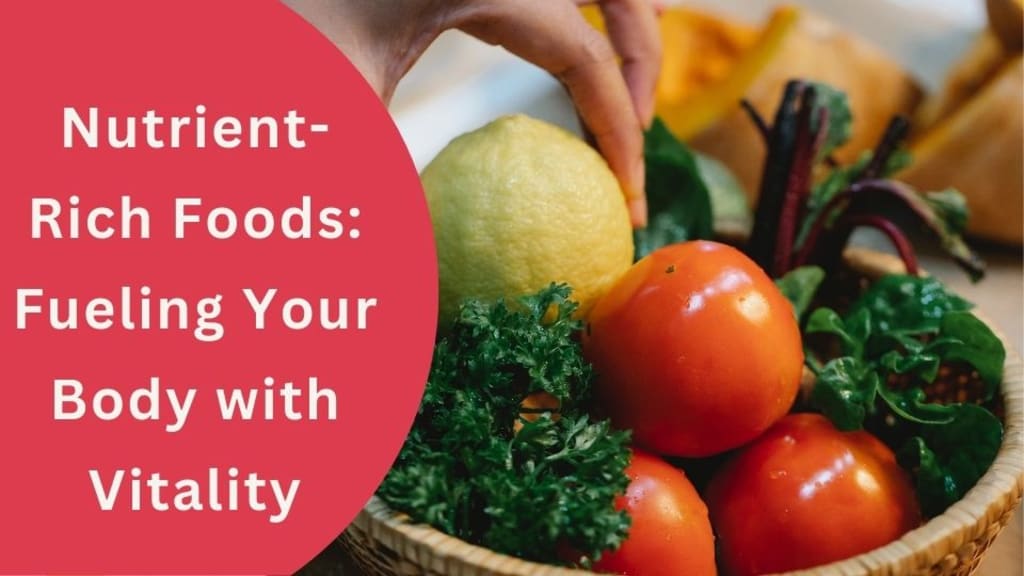Nutrient-Rich Foods: Fueling Your Body with Vitality
Nutrients for a healthy life

Outline:
1. Introduction to Nutrient-Rich Foods
2. Understanding Macronutrients and Micronutrients
• The Role of Macronutrients
• The Importance of Micronutrients
3. Top Nutrient-Rich Foods for a Balanced Diet
• Dark Leafy Greens: A Powerhouse of Nutrients
• Colorful Berries: Antioxidant-Rich Superfoods
• Fatty Fish: A Source of Omega-3 Fatty Acids
• Nuts and Seeds: Packed with Healthy Fats and Fiber
• Whole Grains: A Wholesome Source of Energy
• Legumes: Plant-Based Protein and Fiber
• Lean Meats and Poultry: High-Quality Protein
• Dairy and Alternatives: Calcium and Vitamin D
• Fermented Foods: Gut-Friendly Probiotics
4. Incorporating Nutrient-Rich Foods into Your Diet
• Prioritize Whole Foods
• Plan Balanced Meals and Snacks
• Be Mindful of Portion Sizes
• Experiment with New Recipes and Flavors
• Seek Professional Guidance if Needed
5. Benefits of Including Nutrient-Rich Foods in Your Diet
• Enhanced Overall Health and Well-Being
• Improved Energy Levels and Cognitive Function
• Strengthened Immune System
• Reduced Risk of Chronic Diseases
• Better Digestive Health
6. Common Misconceptions About Nutrient-Rich Foods
• Expensive and Hard to Access
• Tasteless and Boring
• Require Extensive Preparation
• Only for Weight Loss or Specific Diets
7. Conclusion
8. FAQs
1. What are some easy ways to incorporate nutrient-rich foods into my diet?
2. Can I still enjoy my favorite foods while eating nutrient-rich foods?
3. Are organic foods always more nutrient-rich?
4. How can I ensure I'm getting all the necessary nutrients from my diet?
5. Are supplements necessary if I consume nutrient-rich foods?
Nutrient-Rich Foods: Fueling Your Body with Vitality
Nutrient-rich foods play a crucial role in maintaining a healthy and balanced diet. They provide the essential substances our bodies need to thrive and function optimally. From macronutrients like proteins, carbohydrates, and fats to micronutrients such as vitamins and minerals, these power-packed foods are a key component of overall well-being. In this article, we will explore the importance of nutrient-rich foods, discover some top choices to incorporate into your diet, and learn how to maximize their benefits for a healthier you.
Understanding Macronutrients and Micronutrients
The Role of Macronutrients
Macronutrients are the building blocks of our diet and provide us with energy. They include proteins, carbohydrates, and fats. Proteins are vital for repairing and building tissues, while carbohydrates fuel our bodies with energy. Fats, on the other hand, help in hormone production, protect organs, and aid nutrient absorption. Consuming a balanced ratio of these macronutrients is essential for overall health.
The Importance of Micronutrients
Micronutrients, as the name suggests, are required in smaller quantities but are no less important. They include vitamins and minerals that are necessary for various bodily functions. For example, vitamin C boosts our immune system, while calcium is crucial for strong bones and teeth. Consuming a diverse range of micronutrient-rich foods is key to ensuring optimal health and preventing deficiencies.
Top Nutrient-Rich Foods for a Balanced Diet
When it comes to nutrient-rich foods, incorporating a wide variety into your diet is essential. Here are some top choices that can help you achieve a balanced and nutrient-rich diet:
Dark Leafy Greens: A Powerhouse of Nutrients
Dark leafy greens such as spinach, kale, and Swiss chard are packed with vitamins A, C, and K, as well as folate, iron, and fiber. These nutrient powerhouses support immune function, promote healthy digestion, and contribute to strong bones.
Colorful Berries: Antioxidant-Rich Superfoods
Berries like blueberries, strawberries, and raspberries are not only delicious but also rich in antioxidants. These antioxidants help protect our cells from damage caused by harmful free radicals, reducing the risk of chronic diseases and supporting brain health.
Fatty Fish: A Source of Omega-3 Fatty Acids
Fatty fish like salmon, sardines, and mackerel are excellent sources of omega-3 fatty acids. These essential fats contribute to heart health, reduce inflammation, and support brain function. Aim to include fish in your diet at least twice a week.
Nuts and Seeds: Packed with Healthy Fats and Fiber
Nuts and seeds such as almonds, walnuts, chia seeds, and flaxseeds are rich in healthy fats, fiber, and a variety of vitamins and minerals. They provide a satisfying crunch while offering numerous health benefits, including improved heart health and reduced cholesterol levels.
Whole Grains: A Wholesome Source of Energy
Whole grains like quinoa, brown rice, and whole wheat bread are unrefined and contain all parts of the grain, including the bran, germ, and endosperm. These grains provide fiber, B vitamins, and minerals, contributing to sustained energy levels and a healthy digestive system.
Legumes: Plant-Based Protein and Fiber
Legumes, including beans, lentils, and chickpeas, are excellent sources of plant-based protein, fiber, and essential nutrients. They not only provide a sustainable protein source but also contribute to stable blood sugar levels and promote gut health.
Lean Meats and Poultry: High-Quality Protein
Lean meats and poultry like chicken, turkey, and lean cuts of beef are excellent sources of high-quality protein. Protein is essential for building and repairing tissues, supporting muscle health, and keeping you feeling full and satisfied.
Dairy and Alternatives: Calcium and Vitamin D
Dairy products such as milk, yogurt, and cheese are rich in calcium, a mineral crucial for strong bones and teeth. If you are lactose intolerant or prefer non-dairy options, there are also fortified alternatives like almond milk or soy milk that provide calcium and vitamin D.
Fermented Foods: Gut-Friendly Probiotics
Fermented foods like yogurt, sauerkraut, and kefir contain probiotics, beneficial bacteria that support a healthy gut microbiome. A balanced gut microbiome is linked to improved digestion, enhanced immune function, and better overall well-being.
Incorporating Nutrient-Rich Foods into Your Diet
Now that you are aware of some nutrient-rich foods, it's important to know how to incorporate them into your diet effectively. Here are some tips:
Prioritize Whole Foods
Opt for whole, unprocessed foods whenever possible. These foods retain their natural nutrients and are free from added sugars, unhealthy fats, and artificial additives.
Plan Balanced Meals and Snacks
Ensure that your meals and snacks include a combination of macronutrients and micronutrients. Aim for a variety of colors on your plate to maximize the range of nutrients you consume.
Be Mindful of Portion Sizes
While nutrient-rich foods are beneficial, it's important to maintain portion control to avoid overeating. Pay attention to your body's hunger and fullness cues and listen to your body's needs. Remember, balance is key.
Experiment with New Recipes and Flavors
Don't be afraid to try new recipes and experiment with different flavors. Incorporate nutrient-rich foods into your favorite dishes or explore new cuisines to make healthy eating exciting and enjoyable.
Seek Professional Guidance if Needed
If you have specific dietary requirements, health concerns, or are unsure about how to create a balanced meal plan, consider consulting a registered dietitian or nutritionist. They can provide personalized guidance based on your individual needs and goals.
Benefits of Including Nutrient-Rich Foods in Your Diet
Including nutrient-rich foods in your diet can bring about a range of benefits for your overall health and well-being:
Enhanced Overall Health and Well-Being
A diet rich in nutrients supports your body's essential functions, promotes vitality, and contributes to overall well-being. It can improve energy levels, enhance mood, and increase resilience to illness.
Improved Energy Levels and Cognitive Function
Nutrient-rich foods provide the necessary fuel for your body and brain. By consuming a balanced diet, you can experience sustained energy levels throughout the day and improved cognitive function, including better focus, concentration, and mental clarity.
Strengthened Immune System
Many nutrient-rich foods, particularly fruits and vegetables, contain immune-boosting vitamins, minerals, and antioxidants. By incorporating these foods into your diet, you can strengthen your immune system and reduce the risk of infections and illnesses.
Reduced Risk of Chronic Diseases
A diet rich in nutrients is associated with a lower risk of chronic diseases such as heart disease, diabetes, and certain types of cancer. Nutrient-rich foods provide essential nutrients that support various bodily functions and help maintain optimal health.
Better Digestive Health
Fiber-rich foods, including whole grains, legumes, and fruits, promote healthy digestion and prevent digestive issues such as constipation. They support a balanced gut microbiome and contribute to overall gut health.
Common Misconceptions About Nutrient-Rich Foods
There are some common misconceptions about nutrient-rich foods that can deter people from incorporating them into their diets. Let's address a few of them:
Expensive and Hard to Access
Contrary to popular belief, nutrient-rich foods don't have to be expensive or difficult to find. Many affordable options are available, such as seasonal fruits and vegetables, legumes, and whole grains. Local farmers' markets or grocery store sales can be great sources for affordable nutrient-rich foods.
Tasteless and Boring
Nutrient-rich foods can be delicious and flavorful when prepared properly. Experiment with different cooking methods, spices, and herbs to enhance the taste of these foods. Healthy eating doesn't have to be dull or monotonous.
Require Extensive Preparation
While some nutrient-rich foods may require a bit of preparation, there are also many options that are quick and easy to incorporate into your meals. Pre-washed and pre-cut vegetables, canned legumes, and frozen fruits are convenient choices that save time without compromising nutritional value.
Only for Weight Loss or Specific Diets
Nutrient-rich foods are beneficial for everyone, regardless of weight loss goals or specific dietary restrictions. They provide essential nutrients for overall health and should be included in a balanced diet for everyone.
Conclusion
Incorporating nutrient-rich foods into your diet is a powerful way to fuel your body with vitality. By understanding the importance of macronutrients and micronutrients, exploring a variety of nutrient-rich foods, and following practical tips for incorporating them into your meals, you can enjoy the numerous benefits these foods offer. Remember, healthy eating is a journey, so start small, be consistent, and savor the positive changes that nutrient-rich foods bring to your life.
**FAQs
Here are some frequently asked questions about nutrient-rich foods:
1. What are some easy ways to incorporate nutrient-rich foods into my diet?
• Start by adding a serving of fruits or vegetables to each meal.
• Swap refined grains for whole grains in your meals.
• Choose snacks like nuts, seeds, or yogurt instead of processed snacks.
• Experiment with new recipes that feature nutrient-rich ingredients.
2. Can I still enjoy my favorite foods while eating nutrient-rich foods?
Absolutely! Nutrient-rich foods should complement your diet, not replace it entirely. You can still enjoy your favorite foods in moderation while incorporating nutrient-rich foods into your meals. It's all about balance and making mindful choices.
3. Are organic foods always more nutrient-rich?
Organic foods are grown without synthetic pesticides and fertilizers, but their nutrient content can vary. Both organic and conventionally grown foods can be nutrient-rich. The most important factor is to consume a variety of fresh, whole foods, regardless of their organic status.
4. How can I ensure I'm getting all the necessary nutrients from my diet?
A balanced and varied diet is key to ensuring you receive all the necessary nutrients. Focus on including a wide range of nutrient-rich foods, including fruits, vegetables, whole grains, lean proteins, and healthy fats. If you have specific dietary concerns, consulting a healthcare professional or registered dietitian can provide personalized guidance.
5. Are supplements necessary if I consume nutrient-rich foods?
In most cases, nutrient-rich foods can provide the necessary nutrients for a healthy diet. However, certain individuals, such as pregnant women, older adults, or those with specific nutrient deficiencies, may benefit from supplements. It's best to consult with a healthcare professional to determine if supplements are necessary for your individual needs.
By incorporating nutrient-rich foods into your diet, you can nourish your body, support your overall health, and enjoy the benefits of a well-rounded and balanced eating plan.
About the Creator
Ghulam Abbas
Skilled content writer with 15 years' experience in humanities and motivation. Illuminating insights in literature, history, philosophy, and culture, connecting readers to human experiences. Expertise in motivational writing.
Enjoyed the story? Support the Creator.
Subscribe for free to receive all their stories in your feed. You could also pledge your support or give them a one-off tip, letting them know you appreciate their work.





Comments (1)
Nice